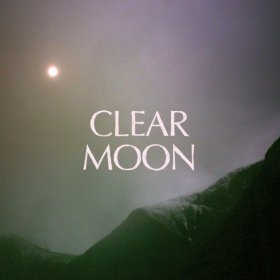"Misunderstood and disillusioned / I go on describing this place/and the way it feels to live and die." Clear Moon, the first of Mount Eerie’s pair of records released this year, opens with something of a manifesto. Ever since his first tentative utterances as a solo artist, Phil Elverum has been forging his own sonic universe, layered with grainy, fibrous acoustic guitars, echoes of barely tuned pianos and the peripheral crackle of lo-fi tape hiss. This dense, tactile sound-world has framed his continual examination of his relationship with the world, expressed in a tangled, often impenetrable, web of twisting narratives and vivid imagery. As its opening lines indicate, Clear Moon / Ocean Roar finds Elverum continuing in this process but with a renewed, and somewhat refreshing, sense of self-awareness.
The feeling of culmination and the drawing together of numerous musical and lyrical threads that accompanies these records is initially apparent in Elverum’s choice of titles: the moon in particular has long occupied a privileged position within the labyrinthine framework of his lyrics. The perpetual, and ultimately unconsummated, balletic dance of the earth and moon lends the latter a particularly desolate, yet graceful, aura that has bewitched many an artist in the past. Continuing in this lineage, Elverum bestows that "glowing ball of rock" with monolithic significance: his moon is an austere emblem of solitude and yearning that haunts his music with its plaintive gaze. Yet his treatment of this symbol is characteristically enigmatic; on ‘Through the Trees pt. 2’ Elverum appears to identify himself with the "gleaming stone", adrift in "the real world of clouds / clawing for meaning", while later, on Clear Moon‘s title track, it has been transformed into a far more foreboding entity, its harsh light piercing through the violently contorting soundscape.
The capricious nature of Elverum’s imagery is symptomatic of a broader sense of ambiguity that cuts through the entirety of Clear Moon / Ocean Roar. This music is evanescent and vague: a spectral fog of weightless synths and shuffling acoustic guitars cloaked in a soft halo of organic reverb. Elverum’s lyrics constantly acknowledge the fragility of our being; his is an ephemeral existence, unmoored and fleeting, at the mercy of the powerful external forces embodied in the mountains, winds, oceans and forests of his songs. "If I look / or if I don’t look / clouds are always passing over" he softly intones as ‘The Place I Live’ stutters into life in a swooning gauze of synths. Later culminating in a shimmering antiphony as a ghostly female vocal line weaves its way through the music, the track exemplifies Elverum’s ability to transform his humble resignation into a cautious optimism; the serenity, and sensual beauty, of the music acts as a reflection of his contented state of acceptance. Or, as he sings on ‘I Walked Home Beholding’, he has become "totally at ease with the meaninglessness of living".
Perhaps this offers a new perspective from which we should view the Mount Eerie project as a whole: a process of searching, "clawing for meaning" both philosophically and musically, that has concluded with the strikingly uncluttered, eloquent statement of Clear Moon / Ocean Roar. These songs, particularly those on Clear Moon, are the most transparent and melodically dynamic that Elverum has penned since The Glow pt. 2 (released in 2001 under the moniker of The Microphones). Even Ocean Roar, described by Elverum as the "more challenging and weirder and darker and heavier" of the pair, displays brief moments of luminosity, such as its lilting title track whose sighing melody is veiled in the metallic of cymbals and iridescent vocal harmonies.
The art critic Peter Schjeldahl has said that "great art creates its own job description" and for many years that’s exactly what The Microphones/Mount Eerie’s music has been doing. With multiple versions of and sequels to songs, self-referential and recycled lyrics, Elverum has always presented his oeuvre as a perpetual work in progress: ever questioning and critical, fragmentary and embracing of imperfection. As such, Elverum seems to inhabit his own disconnected creative world with its own mythology, language and logics. (It is a somewhat jarring experience to watch him doing karaoke to Lil Wayne on this YouTube video.) Yet it would be a mistake to view Elverum’s music as intrinsically otherworldly or remote: it is the human, communicative power of his work, particularly abundant on Clear Moon / Ocean Roar, that makes it so enduring. Despite being set in a shadowy world of mountains and forests, the moon and the ocean, Elverum’s journey, his earnest quest for meaning and significance when faced with the endless mundanity of everyday routine, is one to which we can all relate.


